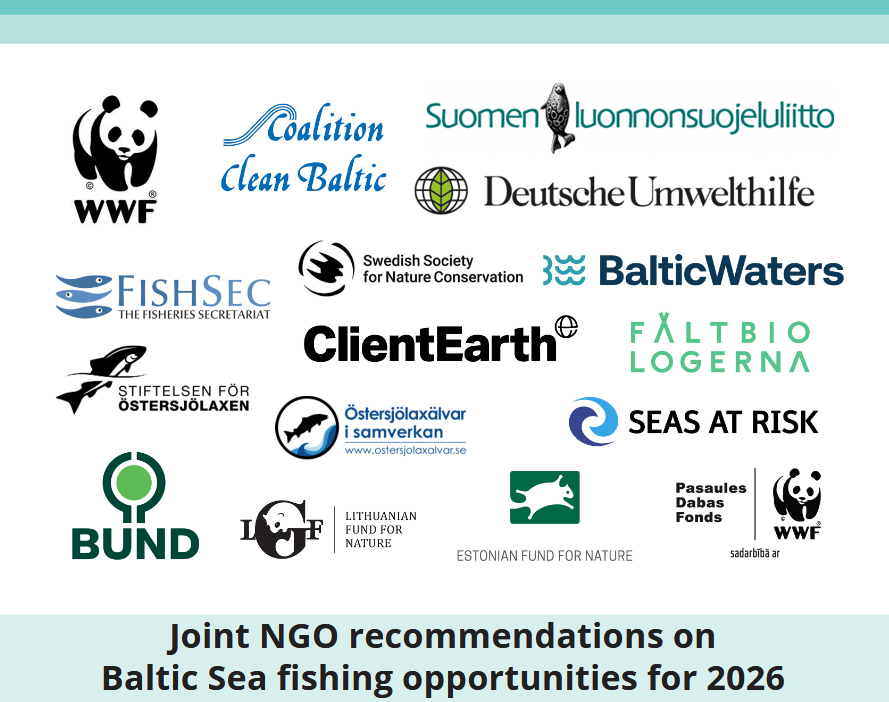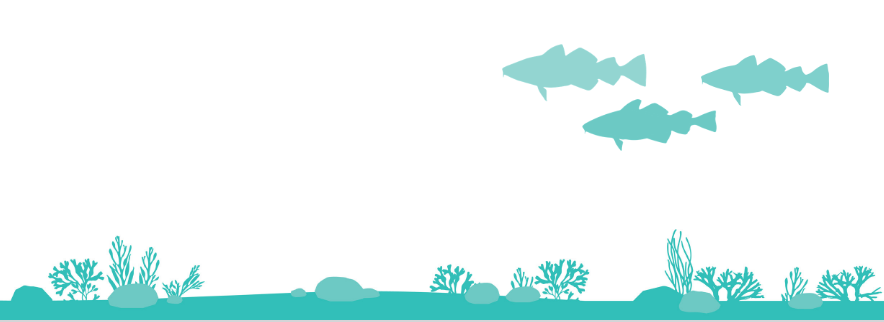Joint NGO recommendations on Baltic Sea fishing opportunities for 2026
On Wednesday, 28 May, the International Council for the Exploration of the Seas (ICES) published its scientific advice for fish stocks in the Baltic Sea. In response, environmental NGOs from around the Baltic Sea region urge the European Commission to propose, and fisheries ministers to adopt, fishing opportunities at levels well below the headline advice to safeguard ecosystem needs and dynamics and allow for rapid recovery of Baltic Sea fish populations.

The poor status and decline of many Baltic Sea fish populations have been thoroughly documented over several decades, indicating that the entire ecosystem is in great distress. So far, policy interventions have not reversed, or even halted, the negative trend concerning most of these populations.
Fish populations that once formed the cornerstone of the Baltic Sea fishery, such as the eastern and western Baltic cod and the western Baltic herring are now doing so poorly that the
International Council for the Exploration of the Sea (ICES) is advising zero catch for these stocks. Yet, even with the targeted fishery being closed for some years now, none of these three stocks are showing sufficient signs of recovery.
The condition (such as weight-at-age) of many flatfish populations, such as plaice, also raises alarm bells. The salmon spawning migration has fallen short of the target level in the past two years. As a result, even the healthiest salmon stocks are now unlikely to produce enough smolts corresponding to sustainable levels in the coming years. Even in cases where populations show minor signs of anticipated increased biomass, such as the Baltic sprat, these presumed increases are tied to a number of scientific uncertainties.
Disregarding the scientific uncertainties, and the warning signals that scientists have been pointing out for years, will have devastating consequences for the ecosystem and those who depend on it. Political will and ambition is needed to improve current fisheries management in the Baltic Sea to address the crisis facing its fish populations and the broader marine ecosystem.
In our briefing, we provide joint NGO recommendations regarding fishing opportunities for 2026, prioritising long-term ecosystem health and sustainable fisheries management over short-term economic interests. The recommendations are based on the ICES advice, the requirements of the Common Fisheries Policy (CFP) and the Baltic Multiannual Plan (MAP) to apply the precautionary approach and implement an ecosystem-based approach to fisheries management, and the objective of achieving Good Environmental Status (GES) under the Marine Strategy Framework Directive (MSFD).

The
current ICES advice
on fishing opportunities - and the requests (by fishery managers like the European Commission) that guide the provision of such advice - do not fully reflect all relevant legal requirements and policy objectives applicable to the EU.
Concretely, they are not geared towards:
1. Recovering fish populations within a concrete timeframe and maintaining them above sustainable levels in the near future;
2. Preventing fish populations from, or minimising the risk of, falling outside safe biological limits, despite legal safeguards in the EU’s MAPs, including the Baltic Sea MAP; or
3. Delivering on all relevant elements of “Good Environmental Status” (GES) under the Marine Strategy Framework Directive (MSFD), such as healthy population structures and/or food web integrity (e.g. leaving enough food in the sea for other marine life).
EU decision-makers must urgently work with ICES to recognise and address these fundamental
shortcomings in the advisory approach, and apply additional precaution by setting fishing opportunities below the ICES headline advice, until the necessary changes have been made.
Fishing at or above advised MSY-based catch levels will not set the Baltic Sea on a clear
path out of the
crisis. We need a management system, underpinned by fully recovery-focused, precautionary and ecosystem-based advice, that goes beyond short-term fishing interests, and instead protects ecosystem functions, fisheries and coastal communities, in the long term.
To improve the scientific advice underpinning fishing opportunities, NGOs recommend that the European Commission should:
● Work with ICES and other relevant ICES advice clients to develop and implement a clear roadmap for how current shortcomings will be swiftly addressed and dealt with when setting fishing opportunities.
● Work with other relevant decision-makers to agree on ecosystem-based fisheries management objectives to inform the ICES advice request process. International commitments on biodiversity conservation, such as Global Biodiversity Framework Directive, Baltic Sea Action Plan (BSAP) of HELCOM Commission as well as the MSFD should provide a basis for these ecological objectives and be considered alongside the rules and objectives of the CFP.
● Change the requests for ICES advice on fishing opportunities to:
a) aim for rapid recovery of fish populations, particularly depleted or at-risk stocks, within a concrete timeframe and for maintaining them above sustainable levels in the near future,
b) prevent or minimise the risk of fish populations falling outside safe biological limits, in line with the legal safeguard in the Baltic MAP to keep the risk of stocks falling below Blim
below 5%,
c) fully reflect ecosystem dynamics and needs and multispecies considerations, also delivering on all relevant elements of Good Environmental Status (GES) under the Marine Strategy Framework Directive (MSFD), such as healthy population structures and/or food web integrity (i.e. leaving enough food in the sea for other marine life), in line with an ecosystem-based approach to fisheries management, and
d) provide sufficiently precautionary alternative catch options where a full incorporation of these aspects is not yet possible, to minimise risks to stocks and the overall ecosystem.
We urge the European Commission to propose, and fisheries ministers to adopt, fishing
opportunities at levels well below the FMSY point value, where available, to allow for the rapid
recovery of Baltic Sea fish populations. This would ensure sufficient precaution, and safeguard
long-term population and ecosystem health, resilience and productivity.
Read the full Joint NGO recommendations on Baltic Sea fishing opportunities for 2026 here.


